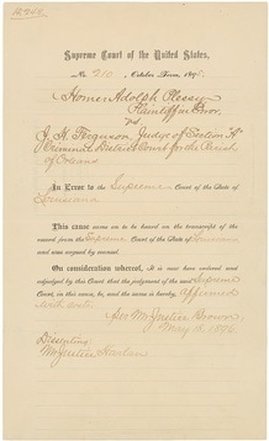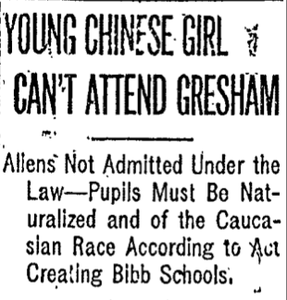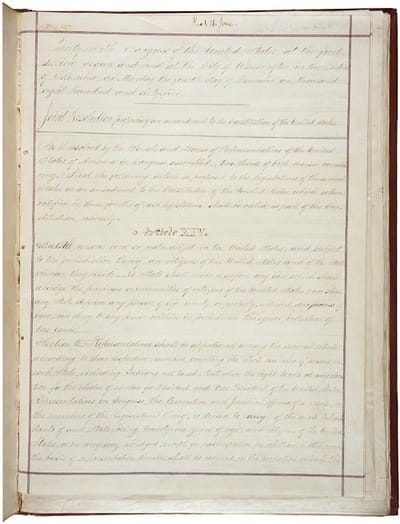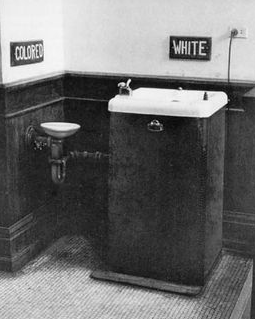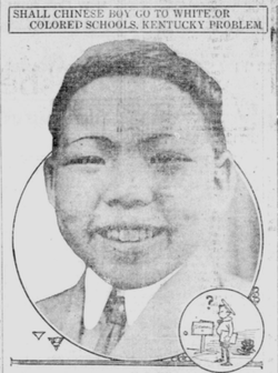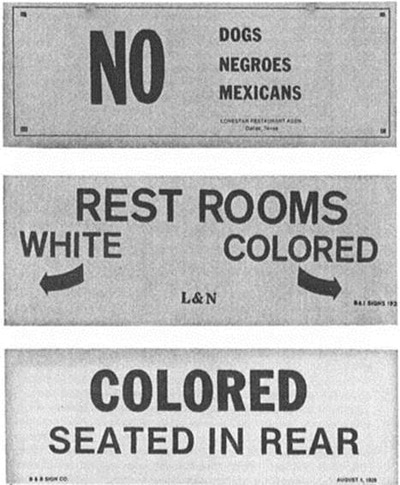Image above: "No Dogs, Negroes, Mexicans. Restroom White/Colored, Colored Seated in Rear." This is a photo of Jim Crow-era signs, by unknown.Courtesy https://padresteve.com/tag/discrimination/.
"That petitioner was a citizen of the United States and a resident of the state of Louisiana, of mixed descent, in the proportion of seven-eighths Caucasian and one-eighth African blood; that the mixture of colored blood was not discernible in him, and that he was entitled to every recognition, right, privilege, and immunity secured to the citizens of the United States of the white race by its constitution and laws; that on June 7, 1892, he engaged and paid for a first-class passage on the East Louisiana Railway, from New Orleans to Covington, in the same state, and thereupon entered a passenger train, and took possession of a vacant seat in a coach where passengers of the white race were accommodated; that such railroad company was incorporated by the laws of Louisiana as a common carrier, and was not authorized to distinguish between citizens according to their race, but, notwithstanding this, petitioner was required by the conductor, under penalty of ejection from said train and imprisonment, to vacate said coach, and occupy another seat, in a coach assigned by said company for persons not of the white race, and for no other reason than that petitioner was of the colored race; that, upon petitioner's refusal to comply with such order, he was, with the aid of a police officer, forcibly ejected from said coach, and hurried off to, and imprisoned in, the parish jail of [163 U.S. 537, 539] New Orleans, and there held to answer a charge made by such officer to the effect that he was guilty of having criminally violated an act of the general assembly of the state, approved July 10, 1890, in such case made and provided."-Plessy v. Ferguson, United States Supreme Court |
The fourteenth Amendment said, "No state shall make or enforce any law which shall abridge the privileges or immunities of citizens of the United States; nor shall any state deprive any person of life, liberty, or property, without due process of law; nor deny to any person within its jurisdiction the equal protection of the laws." But in Plessy v. Ferguson, in 1896, a black man was jailed for sitting in a white passenger train car. He lost his case, allowing 'Jim Crow' segregation to grow. Other decisions also shaped opinions on segregation in schools. In Tape v. Hurley, 1885, the California Supreme Court ruled a little Chinese girl couldn't be excluded from her public school based on race. In 1910, Mei Ling Soong lost the right to attend her school in Georgia. In 1913, Pong Duck won the right to attend his Kentucky school.
"In California, segregation laws required students of Asian descent to attend schools separate from both white and African-American children."- Karen Narasaki. |
"The little chubby fellow is an Oriental, who, with his brother, intends to make the city of Covington their home in America. He is fourteen years old...born in America, but his parents took him to China when he was three years old...Two months ago, they sent him back to America...He is the first Chinese youth ever to apply for admission to the public schools of Covington. But to what school does he belong? In the end, the attorney general decided over objections of some white parents that Pong could attend a white school." -from Shall Chinese Boy Go to White or Colored Schools, Kentucky Problem. |
